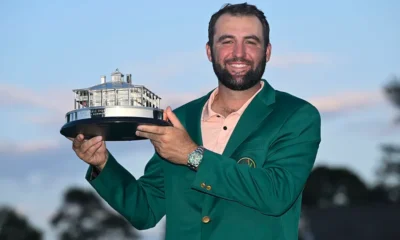Opinion
GAJTKA: Was I Wrong in Wishing Against a Wyndham Win?
There’s something about individual sports that, for me at least, doesn’t lend itself to the time-honored habit of pulling for the underdog.
I think it’s the intimate nature of pastimes like golf and tennis that allows us to form more lasting bonds to our favorite players. Familiarity, in this case, doesn’t lead to contempt.
(Well, maybe I shouldn’t go that far. For the longest time, I couldn’t bring myself to root for Roger Federer.)
More to the point, knowing a little — or a lot — about an athlete allows us to attach emotionally when the stakes are raised and we feel the tension through the television. If we’ve vicariously gone through either tragedy or triumph with a competitor, we feel more of that payoff at the finish line.
Which brings me to this past week’s men’s U.S. Open at Los Angeles Country Club. As the competition headed into the final round Sunday, I could think of several options that would be exciting for me, a lifetime golf follower and frequent golf commentator.
First on my list was Rickie Fowler winning his first major title. The onetime wunderkind almost vanished from the elite level of pro golf for a few years, fighting to rediscover the form of his early 20s. He’d been playing well all year, tied a tournament record in the opening round, and held a share of the 54-hole lead at a Slam for the first time. To say this would be a satisfying post-hype victory is understating it.
Not far behind was Rory McIlroy pulling out his first major win in nine years. He’s been stuck on four forever, it seems, and he’s been an eager — I might say naïve — warrior for the PGA Tour in its now-relinquished war against the forces of Saudi oil money in the sport. For him to grab the trophy in the first major after the truce would be rather fitting, whether you appreciated his principled stance or not.
There were other tasty options as well, from my perspective.
While his on-course persona doesn’t do much for me personally, Scottie Scheffler’s collecting his second major in as many years, as he rides the wave of ridiculously-good ball-striking, would’ve certainly made you reassess his place in history. A Sunday rebound for SoCal’s Xander Schauffele would’ve validate his oft-spectacular talents with a home-game championship. Dustin Johnson could’ve proven quite a lot if he could vault on top for his third major, but his first after taking the massive contract from LIV.
Of course, by now you know that none of that panned out. Wyndham Clark ultimately came up with the goods, shooting an even-par 70 to fend off all his closest pursuers and a course that was turning increasingly treacherous.
I’ll confess to rooting against Clark for most of the weekend. Yes, I realized the guy is a serious player, as evidenced by his runaway win against a strong field at the Wells Fargo this spring.
But, I don’t think I could’ve picked his face out of a police lineup before last week. Rightly or wrongly, Clark’s Q rating among golf fans might not have even been ahead of high-profile amateur U.S. Open competitors Sam Bennett and Gordon Sargent.
Certainly that’s changed now, and regardless of what kind of golf fan you are, there are details to Clark’s story that can captivate. If you like nerding out over mechanics and shotmaking, his 190-mph ball speed off the tee and precise short game will get you going. If you respond more to human interest, his early-career struggles upon the death of his mother will be relatable.
(And if you’re a fan of rare names, a man called Wyndham probably caught your attention. It means ‘from a windy village,’ in case you’re curious. Can an endorsement deal with the hotel conglomerate be far behind?)
So, what am I saying? I guess I’m saying that I was wrong to write off Wyndham as a compelling wynner, er, winner.
But, you know what? Everyone has a story, even if we don’t know it yet. Surely we would’ve discovered a lot more about top-20 finishers Austin Eckroat or Min Woo Lee had they been hoisting the trophy Sunday evening.
I’m not going to apologize for favoring the men whom I simply knew more about. That’s just how we’re wired as humans, try as we might to keep a completely open mind with this sort of thing.
I have a tongue-in-cheek ‘rule’ that I often cite near the conclusion of major golf tournaments: The least interesting storyline will always come through.
Now, I realize that’s both rude and reductive. We’re coming off two very interesting men’s majors, both for the winners themselves and how they got there.
But there’s some truth to my blanket statement. To use the U.S. Open as an example, there’s one winner and 155 players who wish they finished higher. Even if we pare it down to the top 10 or top five, you’re still going against the odds if you prefer one or even two players to come out on top.
That is to say, a) I shouldn’t be surprised when a major finish leaves me a little cold, and b) that doesn’t mean there’s some universal force going against certain golfers. (Although, McIlroy might disagree after he offered a tepid L.A. reprise of last summer’s final-round stall at the Old Course.)
Winning in an individual sport remains wildly difficult. Even in the North American sports leagues, your team is still facing around 30 competitors for the big prize. Insert your LIV or Tour Championship joke here, but that’s better odds than a single player faces in all but the smallest golf fields.
At the same time, we all have only so much mental bandwidth when it comes to rooting interest. At least for me, I can’t be happy for everybody the same amount. I think that’s an unrealistic ask, even if you’re trying to be a fair-minded journalist, which I sometimes do.
So, congrats, Wyndham. Well played. I hope the afterglow of the major is satisfying for your competitive soul.
I still don’t regret wanting someone else to win.













